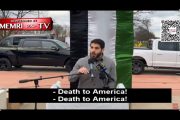
In a “stipulation agreement” supported by attorneys on both sides, Bremerton (Washington) High School assistant football coach Joe Kennedy will have his old job back at the end of the current season:
[Joseph Kennedy] is to be reinstated to his previous position as assistant coach of the Bremerton High School football team on or before March 15, 2023.
Kennedy was fired for one reason and one reason only: Bremerton was following the notion that the Founders somehow had built a “wall of separation” between religion and the state, and that the state was thus free to quash any seeping over from the spiritual world into the secular.
Writing for the majority (6-3) decision in June exonerating Kennedy, Justice Neal Gorsuch touched briefly on that falsehood:
Kennedy’s private religious exercise did not come close to crossing any line one might imagine separating protected private expression from impermissible government coercion. [Emphasis added.]
Tyrants, seizing the quote from Jefferson’s letter to the Danbury Baptists more than a decade after the Constitution was put in place as sufficient proof that government must protect itself from spiritual influence, have sold the canard across the land.
At issue was Kennedy’s kneeling and praying in public view after each game. This was, in the district’s view, a violation of separation of church and state. This view as been pushed for decades, using Jefferson’s remarks in his private letter to the Danbury Baptists as a hammer to remove all religious expression from the public square.
Gorsuch expanded slightly on the myth in his opinion in Kennedy v. Bremerton School District:
Here, a government entity sought to punish an individual for engaging in a personal religious observance, based on a mistaken view that it has a duty to suppress religious observances even as it allows comparable secular speech. [Emphasis added.]
The Constitution neither mandates nor tolerates that kind of discrimination. Mr. Kennedy is entitled to summary judgment on his religious exercise and free speech claims.
The attack on Kennedy’s religious freedom was intentional and deliberate, wrote Gorsuch:
The contested exercise here does not involve leading prayers with the team; the District disciplined Mr. Kennedy only for his decision to persist in praying quietly without his students after three games in October 2015….
Prohibiting a religious practice was thus the District’s unquestioned “object”….
A government entity’s concerns about phantom constitutional violations do not justify actual violations of an individuals’ Frist Amendment rights. [Emphasis added.]
Tim Greenwood of Tim Greenwood Ministries provided one of the clearest definitions of the Founders’ original intent on the matter more than 10 years ago:
The “wall” was understood as one-directional; its purpose was to protect the church from the state.
The world was not to corrupt the church; yet the church was free to teach the people Biblical values [without interference].
The Pilgrims left England over exactly that type of interference. Wrote Greenwood:
The American people knew what would happen if the State established the Church like in England. Even though it was not recent history to them, they knew that England went so far as forbidding worship in private homes and sponsoring all church activities and keeping people under strict dictates.
They were forced to go to the state established church and do things that were contrary to their conscience. No other churches were allowed, and mandatory attendance of the established church was compelled under the Conventicle Act of 1665.
Failure to comply would result in imprisonment and torture.
The people did not want freedom FROM religion, but freedom OF religion.
Coach Kennedy’s restoration to his position at Bremerton is a small victory in the larger war against religion being waged secular and anti-Christian forces in America, using the myth of separation as justification.



